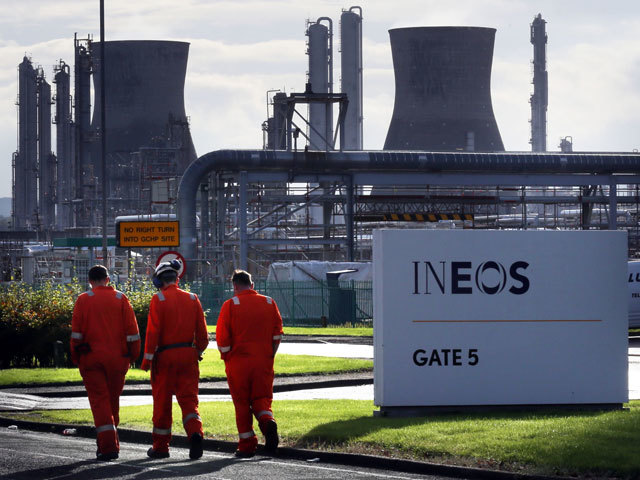
The Scottish Government’s fracking ban is facing a legal challenge from petrochemical giant Ineos.
The Grangemouth owner said it would seek a judicial review of the “unlawful” ban, arguing there were “very serious errors” in the decision-making process.
A moratorium on the controversial gas extraction technique had been in place in Scotland since 2015 and in October last year energy minister Paul Wheelhouse announced that planning regulations would be used to “effectively ban” it by extending the moratorium “indefinitely”.
At the time, he said 99% of respondents to a public consultation backed the ban and government-commissioned research “does not provide a strong enough basis from which to address these communities’ concerns”.
Tom Pickering, operations director at Ineos Shale, said: “The decision in October was a major blow to Scottish science and its engineering industry, as well as being financially costly to Ineos, other businesses and, indeed, the nation as a whole.
“We have serious concerns about the legitimacy of the ban and have therefore applied to the court to ask that it review the competency of the decision to introduce it.”
Ineos Shale has lodged a petition for judicial review alongside co-venture partner Reach at the Court of Session, Scotland’s highest civil court, arguing there was a “failure to adhere to proper statutory process and a misuse of ministerial power”.
The company said the ban on unconventional oil and gas extraction would result in Scotland missing out on economic benefits, including about 3,100 Scottish jobs and £1 billion for local communities.
Ineos Shale said millions that had been invested in acquiring licences and obtaining planning permission for drilling sites had been “rendered worthless” by the ban.
“This despite the panel of scientific experts appointed by the Scottish Government concluding that shale development is capable of being managed safely,” the company said.
Mr Pickering added: “Natural gas keeps the power on and homes warm in Scotland as with the rest of the UK, and shale has the potential not only to meet these needs but also to have a positive impact on the economy and energy security.
“Ineos, Reach and other operators have invested significantly in unconventional development over the years, against a supportive regulatory and planning backdrop.
“If Scotland wants to continue to be considered as a serious place to do business, then it cannot simply remove the policy support that attracted that investment in the first place without proper procedures being followed and without the offer of appropriate financial compensation.
“In the light of these failings, Ineos has been left with no option other than to raise this legal challenge.”
Paul Wheelhouse, minister for Business, Innovation and Energy who first announced the ban said: “We have taken a careful and considered approach to arriving at our preferred policy on unconventional oil and gas in Scotland.
“The Scottish Government’s position was endorsed by the Scottish Parliament in October, subject to completion of a strategic environmental assessment, and follows detailed assessment of the evidence and consultation with the public.”
Alexander Burnett MSP, Scottish Conservative energy spokesman, said: “News of a court challenge should come as no surprise to Scottish Minsters, who were well warned that this could happen.
“Ineos – as well as other operators – invested significant amounts of money over a long period of time, based on what the industry viewed as a supportive policy and planning framework in Scotland.
“Closing the door on the potential of this industry at a time when tens of thousands of jobs had been lost in the North Sea oil and gas sector was a backward step.
“The SNP government’s own advice said that fracking could be carried out safely, but the decision to impose a ban appears to have been based on political dogma rather than science.”
Mary Church, Friends of the Earth Scotland head of campaigns, said: “Ineos’s legal challenge against the Scottish Government’s ban on fracking reeks of desperation from an industry that is failing to get results anywhere in Scotland, the UK or elsewhere in Europe. Wherever fracking has been proposed it has been strongly opposed by local communities and subject to serious delays and mounting costs.
“We are confident that the process to ban fracking was robust and fair, and the courts will find against Ineos. A two year process looked at mountains of scientific evidence that spoke of the risks of the unconventional oil and gas industry to our environment, climate and people’s health.
“There is overwhelming support from communities on the frontline of this industry, people the length and breadth of Scotland, and almost all the parties at Holyrood for this ban. In challenging this ban Ineos are attempting to overturn a democratic process that engaged tens of thousands of people across the country and found that 99% were opposed to the dirty industry.
“Sadly, given the companies tactics south of the border it’s little surprise that Ineos are taking this course of action. Ineos are no doubt taking this challenge to keep alive their hope of ever making any money out of this toxic industry.”
Green MSP Mark Ruskell said: “This is a predictable and desperate attempt by an industry sinking under public protest in England to try and salvage the last drop of commercial benefit in Scotland.
“Scotland doesn’t want or need fracking and Ineos should accept they lost the democratic debate in the Scottish Parliament, the evidence was there to ban fracking and that is what Holyrood has done.”
Scottish Labour’s Claudia Beamish said: “Ineos is out of step with the public and the Scottish Parliament when it comes to fracking.
“The people of Scotland don’t want it to happen and the Scottish Parliament has said that it’s not the right option for Scotland – not right for our communities, our water, our air and the future of our planet.”
Recommended for you
